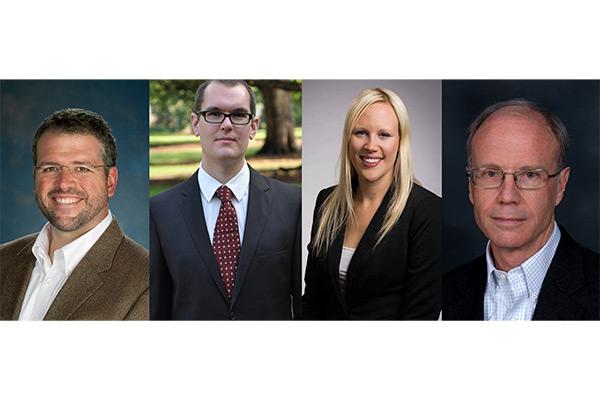Four Mershon affiliates featured in latest issue of 'Ascent'

Research by four Mershon Center affiliates is featured in the Autumn 2018 issue of Ascent, published by the College of Arts and Sciences at Ohio State.
Bear Braumoeller, associate professor of political science, and Skyler Cranmer, Carter Phillips and Sue Henry Associate Professor of Political Science, were interviewed for "The Science of Peace," taking aim at conventional wisdom on war and peace.
For Braumoeller, recent scholarly works and popular books advancing the decline of war and violence are troubling. “That theory and the evidence used to support it left me with a nagging little itch that something might not be quite right,” he said.
Similarly, Cranmer is skeptical of people who write off the United Nations as a paper tiger. “I don’t like assumptions,” he said. “I wanted to determine whether the U.N. really fulfills its mission of suppressing conflict.”
Hollie Nyseth Brehm, assistant professor of sociology, discussed her research in Rwanda for "Resilience in the Aftermath of Genocide."
For nearly a decade, Brehm has been chronicling the history of the Rwandan genocide, painstakingly analyzing data from nearly two million court trials and conducting countless interviews with both perpetrators and victims of the genocide.
“While many people believe that genocide is unpredictable, I study how it is actually patterned,” said Brehm, who serves on the U.S. Political Instability Task Force creating risk models and identifying factors that influence when, how and why genocide occurs. “There are state-level and societal-level factors that cause genocide, and there are individual-level factors that cause people to participate.”
Mershon Oversight Committee member John Casterline, Robert T. Lazarus Professor in Population Studies, is director of Ohio State’s Institute for Population Research, one of the premier population and health research centers in the world and one of only a handful with concentrated expertise in the demography of Africa. Research by Casterline and a team of affiliated faculty featured in "The African Century" is at the forefront of investigating a broad range of population and health issues that affect the well-being of families and communities in Africa.
According to United Nations projections, Africa’s population will triple between 2000 and 2050, increasing from about 800 million to roughly 2.4 billion people. It will then nearly double between 2050 and 2100, to 4.2 billion. At the end of the century, Africa is projected to have nearly as many people as all of Asia, and roughly as many as the entire world did in 1980. Nearly two out of every five people on Earth in 2100 will be African.
The Autumn 2018 issue of Ascent also recognizes recent achievements of several Mershon faculty affiliates:
- Katherine Borland, associate professor of comparative studies, is the recipient of a prestigious 2018-2019 Fulbright Bicentennial Chair in American Studies award.
- Hollie Nyseth Brehm, assistant professor of sociology, won the 2018 Ruth Shonle Cavan Young Scholar Award from the American Society of Criminology.
- Sociologists Craig Jenkins, Maciek Slomczynski and Irina Tomescu-Dubrow received a four-year, $1.4 million NSF award funding work to develop an international database, derived from 3,000+ national surveys administered over five decades to more than 3.5 million respondents in more than 150 countries.
- Janet Box-Steffensmeier, political science, interim dean of the College of Arts and Sciences, and Geoffrey Parker, Andreas Dorpalen Professor of History, were elected to the 237th class of the American Academy of Arts and Sciences.
